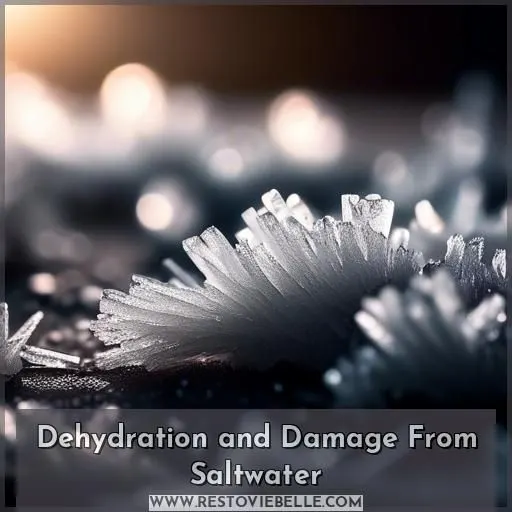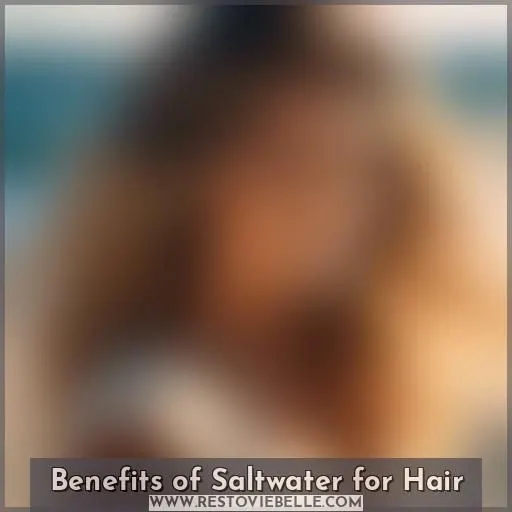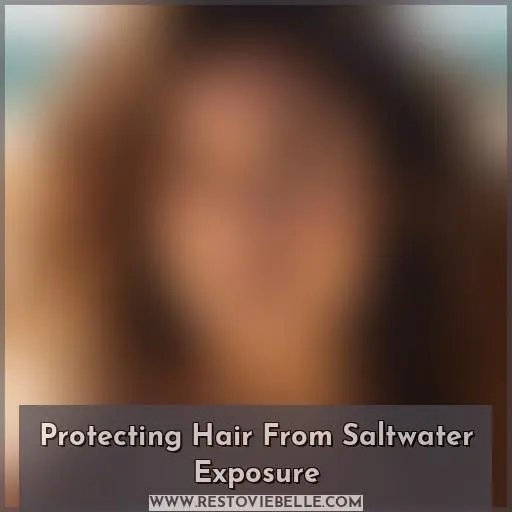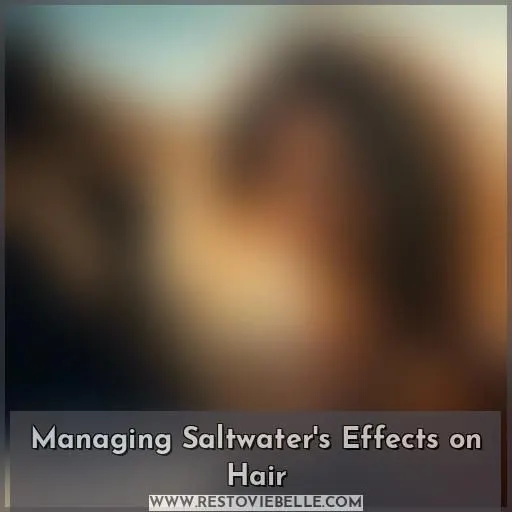This site is supported by our readers. We may earn a commission, at no cost to you, if you purchase through links.
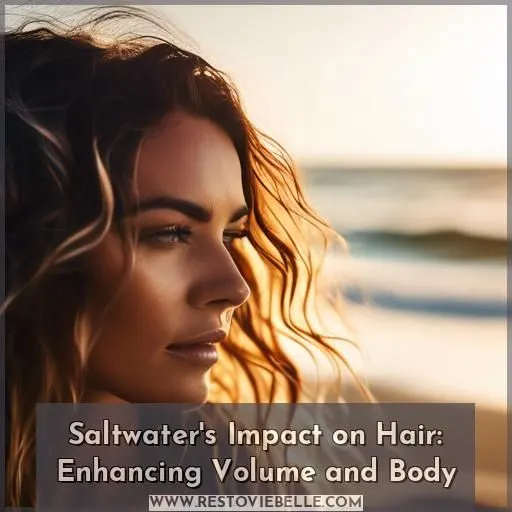
Saltwater can indeed give body to your hair, enhancing volume and texture. When saltwater interacts with your hair, it creates cross-links between strands, curling them and lifting the cuticle. This process can lead to moisture loss, making your hair susceptible to dryness and brittleness, especially if it’s chemically treated.
However, the benefits include beachy waves, scalp health improvement, and excess oil absorption. To protect your hair from potential saltwater damage, consider pre-swimming wetting, using a swim cap, and applying a leave-in conditioner post-swim.
Table Of Contents
Key Takeaways
- Saltwater can enhance volume and body in your hair by creating cross-links within strands, curling and curving them.
- Saltwater can lead to dryness and brittleness, which can be detrimental to your hair.
- To protect your hair from saltwater damage, consider wetting it with fresh water before swimming, wearing a protective hairstyle, and rinsing it with fresh water after exposure.
- Saltwater can add texture and create beachy waves in your hair, while also providing nutritional benefits for your scalp and fighting against dandruff caused by fungus.
Saltwater’s Impact on Hair Structure
Saltwater can enhance volume and body in your hair by creating extra cross-links within strands, curling and curving them. However, it can also lift the hair cuticle, making it susceptible to further moisture loss.
Enhances Volume and Body
Craving that beachy hair look? Delve into the wonders of salt water for an instant boost in hair fullness. A spritz of sea salt spray can elevate your hair volume, mimicking the ocean’s own styling magic. Plus, the natural scalp exfoliation it offers is a bonus for your hair health. So, go ahead, let salt water pump up your locks!
Lifts Hair Cuticle for Moisture Loss
Saltwater’s impact on hair structure is multifaceted. It lifts the hair cuticle, making it susceptible to moisture loss. This increased permeability can lead to hydration techniques for hair, but it also means hair is more vulnerable to damage.
Salt crystal absorption can worsen the condition of chemically altered hair strands, causing color fading and scalp irritation.
To protect your hair, consider wetting it with fresh water before swimming, wearing protective hairstyles, and rinsing it with fresh water after exposure.
Dehydration and Damage From Saltwater
Saltwater can enhance volume and body in your hair, but it also comes with potential downsides. Dryness and brittleness may occur due to the dehydrating effects of salt crystals on hair strands. The weakening of the hair cuticle can lead to split ends and breakage, while color fading and scalp irritation are further concerns.
Dryness and Brittleness
Saltwater’s impact on hair extends beyond enhancing volume and body. It can also lead to dryness and brittleness, which can be detrimental to your hair. Salt crystals can wick away moisture from hair strands, making them dry and brittle. Additionally, salt reduces the crosslinks between cysteine bonds in hair strands, making them more fragile.
However, there are benefits to saltwater exposure, such as its antifungal properties, magnesium benefits, exfoliation benefits, and hair growth stimulation.
To manage the effects of saltwater on your hair, it’s crucial to wet your hair with fresh water before swimming, wear a protective hairstyle, and rinse your hair with fresh water after exposure.
Weakening of Hair Cuticle
When saltwater interacts with your hair, it can cause damage to the hair follicle and lead to protein loss. This damage is exacerbated by UV exposure and chemical reactions, which can result in hair breakage and reduced hair growth.
However, sea salt spray can help enhance beachy waves and add volume to your hair, while also providing some nourishment.
To protect your hair, make sure you wet it with fresh water before swimming, wear a protective hairstyle, and rinse it with fresh water after exposure.
Color Fading and Scalp Irritation
Diving into salt water might give your hair those coveted beach waves, but beware of the trade-offs. Color loss and scalp sensitivity can be the uninvited guests of your beachy hair party. Sun exposure and salt water can tangle more than just your toes in the sand.
Post-swim, a hair mask can be your best ally, rejuvenating scalp blood flow and restoring those waves without the wear.
Benefits of Saltwater for Hair
Saltwater can add texture and create beachy waves in your hair, while also providing nutritional benefits for your scalp and fighting against dandruff caused by fungus.
Adds Texture and Beachy Waves
- Saltwater curls: Saltwater forges additional bonds within hair strands, naturally twisting and curving them.
- Hair texture: Saltwater can enhance the volume and fullness of your hair, giving it a more voluminous appearance.
- Beachy waves: Saltwater serves as an ideal medium for accentuating your hair’s texture, facilitating the creation of beachy waves.
- Volumizing effects: Saltwater can elevate the hair cuticle, increasing its vulnerability to moisture loss, while simultaneously augmenting volume.
Embrace the ocean and let your hair radiate!
Nutritional Benefits for Scalp Health
Diving into the sea isn’t just a leap of freedom; it’s a plunge into a natural spa for your scalp. The ocean’s brew, abundant in magnesium, not only calms your nerves but also fosters hair growth by enhancing blood flow. Bid farewell to oil-slicked roots and embrace volume, as saltwater performs its wonders in eliminating excess oils.
| Benefit | How It Works |
|---|---|
| Magnesium Absorption | Calms nerves, enhancing overall scalp health |
| Hair Growth Stimulation | Improves blood flow, encouraging stronger hair |
| Blood Flow Improvement | Nourishes scalp, ensuring healthy hair follicles |
| Dandruff Reduction | Keeps scalp clean, reducing flake formation |
| Oil Absorption | Removes excess oil, adding volume to hair |
Antifungal Properties
Embrace the power of saltwater to combat fungal scalp issues and boost hair health. Saltwater’s antifungal properties can help fight dandruff and promote a healthier scalp.
By exfoliating the scalp and stimulating blood flow, saltwater can contribute to better hair growth. Don’t let fungal scalp issues hold you back. Harness the benefits of saltwater for a more vibrant, luscious head of hair.
Protecting Hair From Saltwater Exposure
To protect your hair from saltwater’s damaging effects, start by wetting your hair with fresh water before swimming. Additionally, consider wearing a protective hairstyle or swim cap to minimize exposure. After swimming, rinse your hair thoroughly with fresh water and apply a leave-in conditioner or hair mask to restore moisture.
Pre-swim Hair Wetting
Before plunging into the briny deep, it’s imperative to safeguard your tresses from the corrosive effects of saltwater. A simple yet efficacious measure is to dampen your hair prior to swimming. This pre-swim ablution aids in minimizing the quantity of saltwater your hair imbibes, acting as a protective barrier.
Furthermore, contemplate donning a protective coiffure or swim cap to further shield your locks from the salt’s desiccating effects. These modest steps can make a substantial difference in maintaining the salubrity and aesthetics of your hair.
Protective Hairstyles and Swim Caps
After pre-soaking your locks, consider these savvy strategies to shield your strands from the salty siege:
- Opt for braids or buns to minimize tangles and breakage.
- Don a swim cap for an extra layer of defense.
- Embrace serums that fortify against the briny deep.
- Regular trims keep those salty split ends at bay.
Post-swim Rinsing and Conditioning
After a day at the beach, it’s essential to rinse your hair thoroughly with fresh water to remove any salt residue. Use leave-in treatments or hair masks for deep conditioning, and consider clarifying shampoos to remove product buildup. Avoid excessive exposure to saltwater by rinsing your hair regularly.
A little saltwater can enhance your hair, but too much can lead to damage.
Sea Salt Spray for Beachy Waves
To enhance volume and body in your hair, consider using sea salt spray. This product is perfect for those with naturally fine or flat hair, as it adds texture and body without weighing down your locks. Sea salt spray works by absorbing excess oils and adding grit to your hair, giving it a fuller appearance. It’s also great for creating beachy waves, as it helps define and enhance your natural curl pattern.
To use sea salt spray, apply it to damp hair and scrunch it in with your hands. Allow it to dry naturally for best results. Remember to follow the instructions on the product label for best use and to avoid over-drying your hair.
Nourishing and Protecting Hair
Embrace the power of saltwater for nourishing and protecting your hair. Sea salt sprays provide texture and light hold, while also delivering amino acids for strength and antifungal protection. Exfoliating scalp with saltwater stimulates blood flow, promoting healthy hair growth. Absorbing excess oils prevents greasiness, and using clarifying shampoos after exposure helps maintain a balanced scalp.
Avoiding Saltwater Damage
To prevent saltwater damage, it’s crucial to implement protective measures. Prior to swimming, dampen your hair with fresh water to reduce absorption of saltwater. After swimming, rinse your hair thoroughly with fresh water and apply a leave-in conditioner or hair mask. If you seek sea salt alternatives, consider using moisturizing hair products or sea salt sprays formulated with natural ingredients. Bear in mind, hydration is essential to maintaining healthy hair.
To prevent saltwater damage, it’s crucial to implement protective measures:
Prior to swimming, dampen your hair with fresh water to reduce absorption of saltwater.
After swimming, rinse your hair thoroughly with fresh water and apply a leave-in conditioner or hair mask.
If you seek sea salt alternatives, consider using moisturizing hair products or sea salt sprays formulated with natural ingredients.
Bear in mind, hydration is essential to maintaining healthy hair.
Managing Saltwater’s Effects on Hair
To manage the effects of saltwater on your hair, it’s essential to use ocean water judiciously, explore alternatives to sea salt sprays, and guarantee adequate hydration and nutritional support for your hair.
Using Ocean Water Responsibly
Using ocean water responsibly can help you enjoy the benefits of saltwater on your hair without the negative effects. Here are some tips to manage saltwater’s impact on your hair:
| Benefits of Ocean Water | Responsible Use |
|---|---|
| Enhances volume and body | Wet hair with fresh water before swimming |
| Lifts hair cuticle for moisture loss | Wear a protective hairstyle or swim cap |
| Adds texture and beachy waves | Avoid diving headfirst into the water |
| Exfoliates scalp and promotes blood flow | Rinse hair with fresh water regularly |
| Contains vitamins, minerals, and amino acids | Apply a leave-in conditioner or hair mask after swimming |
| Provides antifungal properties | Use a clarifying shampoo to remove product buildup |
| Mimics benefits of ocean water | Drink plenty of water to stay hydrated |
| Promotes healthy hair growth | Avoid consistent use of sea salt sprays |
Alternatives to Sea Salt Sprays
While ocean water’s allure is undeniable, you don’t need to plunge into it to get that tousled mane. Consider these natural alternatives:
- DIY salt sprays with diluted sea salt and essential oils.
- Home remedies like sugar sprays for a gentler lift.
- Ingredient substitutes such as aloe vera gel for moisture and definition without the crunch.
Hydration and Nutritional Support for Hair
To maintain healthy hair and support its growth, it’s essential to provide your hair with the necessary nutrients and care. Here’s a 2-column, 3-row table that summarizes some vital elements for hair health:
| Nutrient | Benefits |
|---|---|
| Magnesium | Promotes hair growth, reduces inflammation, and supports healthy cell regeneration |
| Exfoliation | Removes product buildup, prevents dandruff, and encourages hair growth |
| Hydration | Maintains hair moisture, prevents damage, and supports overall hair health |
Incorporating these elements into your hair care routine can help you achieve healthy, strong, and vibrant hair. Here are some ways to implement these nutrients and practices:
- Magnesium: Incorporate magnesium-rich foods into your diet, such as dark leafy greens, nuts, and seeds. You can also consider taking magnesium supplements, like magnesium citrate, which is easily absorbed by the body.
- Exfoliation: Use a scalp scrub or chemical exfoliant, like salicylic acid, to remove dead skin cells and product buildup. Exfoliate once or twice a week, depending on your scalp concerns and hair product usage.
- Hydration: Keep your hair moisturized by using hydrating hair products and regularly applying leave-in conditioners or hair masks. Drink plenty of water to support overall hair health.
Frequently Asked Questions (FAQs)
How does salt water affect the texture of hair?
Salt water can have both positive and negative effects on the texture of hair. On one hand, it can add volume and body to hair by creating extra cross-links within hair strands, curling and curving them. It can also lift up the hair cuticle, making it susceptible to further moisture loss.
On the other hand, salt water can be drying and dehydrate hair, making it dry and brittle. It can also weigh down hair, create tangles, and irritate the scalp.
To minimize the negative effects of salt water on hair, it’s recommended to wet hair with fresh water before swimming, wear a protective hairstyle, avoid diving headfirst, limit time spent in salt water, and rinse hair with fresh water regularly after swimming. Additionally, using a leave-in conditioner or hair mask after swimming can help to restore moisture and protect against damage.
Can salt water cause hair loss?
Like Icarus flying too close to the sun, overindulging in salt water’s allure can lead to hair loss. Its high sodium content can dry out and weaken strands, making them more prone to falling out.
How can I protect my hair from salt water damage?
To protect your hair from saltwater damage, follow these steps:
- Wet your hair with fresh water before swimming to reduce its absorption of saltwater.
- Tie your hair up in a protective style like a braid or bun to keep it out of the water.
- Rinse your hair thoroughly with fresh water immediately after swimming to remove salt and chlorine.
- Apply a leave-in conditioner or hair mask to add moisture back into your hair.
- Avoid tight hairstyles that can cause breakage.
- Use a swimming cap to minimize exposure to saltwater and chlorine.
- Consider using pre-swim treatments like argan oil to create a barrier against saltwater damage.
- Post-swim, use a nourishing conditioner with quality polyquats to provide slip and restore moisture to your hair.
- For an added boost, try a hair mask with hyaluronic acid to replenish saltwater-logged strands.
- If you’re at the beach regularly, consider a protein treatment to strengthen your hair and counteract the effects of saltwater.
What are the benefits of using sea salt sprays for hair?
Sea salt sprays are a versatile hair product that can enhance your natural hair and boost your confidence. They add texture and volume to your hair, making it look fuller and more voluminous, even for those with thinning hair.
For men with naturally curly hair, sea salt sprays can enhance the natural curl pattern, adding definition and texture. They can also help maintain volume and avoid a flat, lifeless look for those with medium to long hair.
Overall, sea salt sprays are a simple tool that can work wonders in enhancing your natural hair and style.
How often should I use salt water for hair treatments?
To answer your question, it’s recommended to use sea salt sprays sparingly, 2-3 times per week at most, depending on your hair type and condition. Overuse can cause dryness and damage over time.
Conclusion
Saltwater can give your hair body and texture by enhancing volume and body through the creation of cross-links between strands, which curl them and lift the cuticle. However, this process can lead to moisture loss and potential damage, especially for chemically treated hair.
To protect your hair from saltwater‘s effects, consider pre-swim wetting, using a swim cap, and applying a leave-in conditioner post-swim. This will help you embrace the benefits of saltwater while taking care of your hair’s health.

